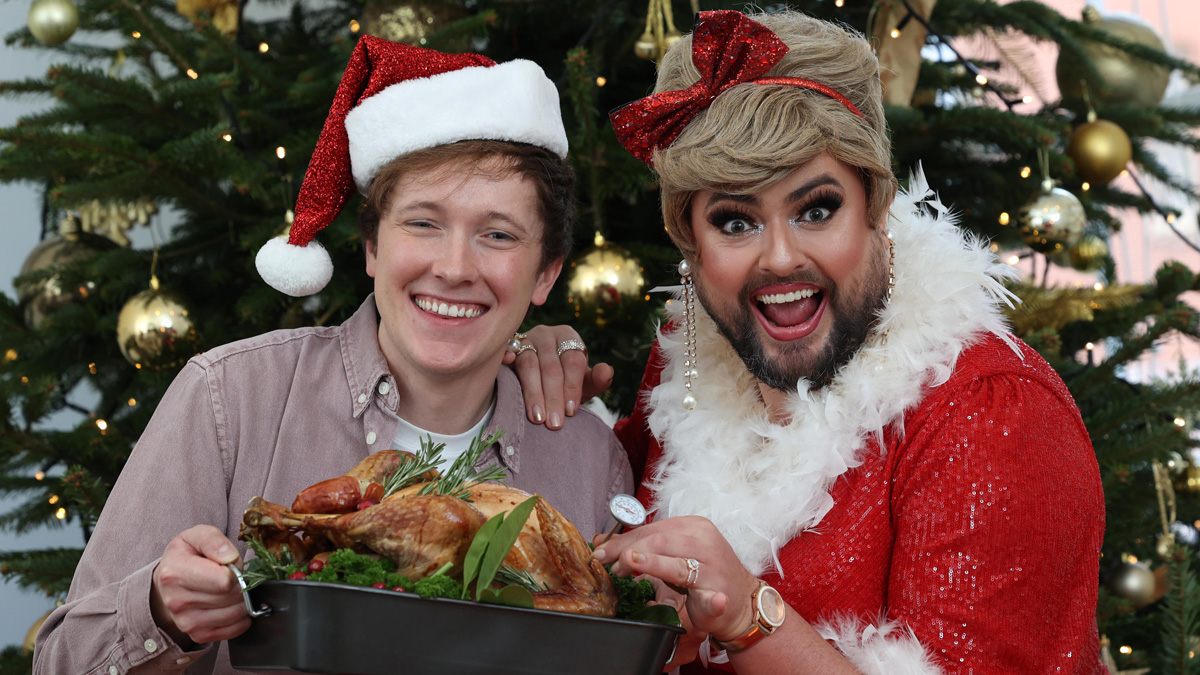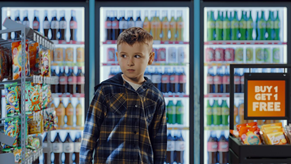Christmas advice from safefood

safefood reveals 39% of people are concerned about getting Christmas dinner right this year
Dublin, 6th December 2022: New research from safefood reveals that almost 4 in 10 people are concerned about getting Christmas dinner right this year. The main concern is the cost of the food (52%) while 9% of respondents claimed to be worried about overcooking turkey and 6% are focused on undercooking it and not being sure if it’s safe to eat. Other concerns included getting all of the food to the table hot (9%) and having leftover food that goes to waste (9%).
The research was commissioned by safefood as part of the annual ‘Trust the Meat Thermometer’ campaign. This year, safefood is again supporting home cooks to help them ensure that turkey is neither overcooked and more importantly, not undercooked. Their advice is to use a meat thermometer to ensure that turkey is cooked through to 75 degrees Celsius. safefood also has extra information this year on Christmas dinner leftovers to ensure they’re not going to waste.
Launching the campaign, Dr Linda Gordon, Chief Specialist in Food Science, safefood said, “This year we know that the focus on cost is a big feature of many people’s Christmas and so getting dinner right is more important than ever. With almost 80% of homes cooking a turkey this year we want to support those home cooks to get it just right. My main recommendation is to use a meat thermometer. They are affordable, easy to use, and add that extra layer of reassurance when making sure that foods like turkey is safely cooked. Whatever cooking method, timings or recipes used; you will know the turkey will be ready to eat when you take it out of the oven and pop the meat thermometer in the thickest part of the meat between the breast and leg and it reaches 75 degrees Celsius.”
The safefood research also reveals that while 41% plan to cook the same size turkey as last year, 18% will opt for a smaller turkey, and 10% will opt for a turkey crown. This is in a bid to reduce excess leftovers, which is a key concern for 9% of people.
“For lots of helpful tips including food safety advice, a cooking time calculator for your turkey and tasty leftover recipes, visit safefood.net/Christmas. December is the busiest month of the year on our website and last year, we had more than 80,000 people visit our site just between Christmas Eve and Christmas Day for practical advice”, added Dr Gordon.
Supporting the campaign, Chef Adrian Martin added, “I’m delighted to support safefood in helping home cooks prepare for Christmas dinner. Research told us that people are worried about managing excess leftovers this Christmas. My advice is to place cooked leftovers in the fridge within two hours of cooking. Once refrigerated, they should be eaten within three days. In advance of food prep, I suggest getting the fridge festive-ready and fresh with a good clean. My next step is to check the cooking calculations and form a plan for your day. Lastly, enjoy the process and a wonderful meal surrounded by family and friends!”.
The safefood Christmas campaign is also supported by EUROSPAR. Commenting, Malachy Hanberry, Managing Director EUROSPAR said, “We have a vibrant butchery/meat offering at EUROSPAR and as part of that we see creating awareness and highlighting the importance of food safety standards to our customers as a vital part of the service we provide the community and participating supermarkets will be distributing free cooking leaflets and retailing meat thermometers in the weeks leading up to Christmas.”
Free leaflets will also be available in more than 200 butcher shops with the support of the Association of Craft Butchers in Ireland (ACBI).
For more information, visit www.safefood.net/christmas or follow safefood on Facebook, Twitter & Instagram.
ENDS
Pictured above are Chef, Adrian Martin and TV Presenter, James Patrice
For more information or to request an interview, please contact:
Wilson Hartnell
Cliona Plunkett
[email protected]
Mob +353 (0)83 854 4925
Or
Dermot Moriarty/Maeve Wrixon
safefood
Mob: +353 86 381 1034 (Dermot) +353 87 437 2080 (Maeve)
Email: [email protected]
About the Research
The research was conducted through an online survey across a nationally representative sample of N=1,013 adults aged 18+ during November 2022. Research was conducted amongst members of Empathy Research’s proprietary research panel.
Editor’s Notes
safefood’s top Christmas dinner tips and myth busters
Christmas dinner is the largest (and sometimes most stressful) meal of the year that many of us will cook with turkey as the focus. Getting it just right can bring a fair amount of pressure whether you’re a novice cook or more experienced. Because food safety never takes a day off, the following tips and myth-busters will help make sure your Christmas dinner is delicious and safe to serve.
TIP: Get your fridge festive and fresh.
- Getting your fridge clean for Christmas and ready for turkey is essential. Your fridge should be given a spring clean every 3-4 months while keeping on top of spillages and regularly wiping down shelves.
- Remember to store your turkey on the bottom shelf so any drips won’t land on food spreading germs and leaving them unsafe to eat.
- You should also ensure any foods past their use-by date are thrown out.
TIP: Check cooking calculations.
- Don’t leave your turkey cooking time to chance! Raw poultry and meat can contain germs like Salmonella and Campylobacter and it’s important to cook these foods thoroughly.
- Preheat your oven to 180° (Fan Assisted) and cover the turkey with tinfoil during cooking as this helps it to cook more evenly and gives a “juicier” product.
- The turkey should be basted every hour during cooking. (The tin foil can be removed for the last half hour to finally brown the skin).
- You can find cooking times for your turkey size at www.safefood.net/christmas.
TIP: Use your leftovers
- Cover any leftovers and place them in the fridge within two hours of cooking.
- Ensure any meat is cooled as quickly as possible – cutting it into pieces will help with this.
- Once in the fridge, any leftovers should be eaten within three days.
- For more information on leftover recipes and inspiration, visit www.safefood.net/christmas.
TIP: Reheating leftovers.
- Remember, if food is already cooked – only reheat food once.
- When reheating food, ensure it is piping hot throughout.
TIP: Freezing leftovers.
- If freezing leftover meat or poultry, wrap it well and make sure it is stored in a suitable container for freezing.
- Freeze cooked meat for no more than 6 months, this is for quality rather than safety.
Myth: Turkey should be washed before cooking it.
- NO! Rinsing turkey (or chicken or meat) is a definite no as this can spread food-poisoning bugs around your kitchen. Water that splashes from rinsing meat can spread its germs up to a metre (or an arm’s length) around your sink. That means that bacteria can mingle with ready-to-eat foods, kitchen utensils like chopping boards and anything else that's in the vicinity.
- Cooking meat to reach 75 degrees C internally will kill any food-poisoning bacteria.
Myth: Stuffed turkeys cook in the same time as unstuffed turkeys.
- You need to give stuffed turkeys more cooking time.
- For stuffed turkeys cooked in a fan oven, you should allow extra cooking time as safefood research has shown that when a turkey is stuffed in the body cavity, it is the centre of the stuffing that is slowest to cook.
- With stuffed turkeys, it is essential you check the stuffing itself is piping hot all the way through, as well as making sure the meat at the thickest part of the breast is cooked thoroughly before serving.
- Try not to overstuff the turkey; use a maximum of 10% of the weight of the bird in stuffing for example no more than 500g of stuffing for a 5kg turkey.
- To help with this, we have a ‘Turkey Cooking Time’ calculator on our website, www.safefood.net/christmas.
Myth: The bigger the turkey, the better.
- Only buy the turkey you need to avoid unnecessary food waste. If you’re unsure, ask your butcher and think about how many people you’re cooking for (children eat less than adults) and whether you want any leftovers.
- For 4-6 people, a 3-4kg turkey should work.
- For 6-8 people, a 4-5kg turkey should work.
- For 8-10 people, a 5-6 kg turkey should work.
Myth: You can cook your turkey from frozen.
- NO and always give yourself enough time to defrost your turkey. For a frozen turkey or any frozen poultry, the safest and recommended way to defrost it is to place it on a dish or tray on the bottom shelf of your fridge.
- Remember to allow 24 hours for every 4-5 pounds/1.8-2.2kg.
- Give yourself plenty of time; it can take up to 3 days to fully defrost a frozen 7.5kg/15lb turkey, so you may need to take it out to defrost on 22nd December.
- You’ll know it’s fully defrosted when:
- the body is soft.
- the legs can be moved and there are no ice crystals inside the cavity.
- Once thoroughly defrosted, a previously frozen turkey cooks the same way as a fresh turkey.
Myth: You know your turkey is done when the cooking time is up.
- No, cooking time is a general guide. To ensure a turkey is fully cooked, we recommend using a meat thermometer. Pierce the thickest part of the turkey (between the leg and breast) and if it reads 75 degrees Celsius, then it’s safely cooked.
- If you don’t have a meat thermometer, use a clean fork or skewer to pierce the thickest part of the breast and thigh. You’ll know it’s cooked when:
- It’s piping hot throughout.
- Its juices run clear.
- There is no pink meat left.
- Any stuffing is piping hot throughout.
From all at safefood, wishing you and yours a very Happy Christmas.




